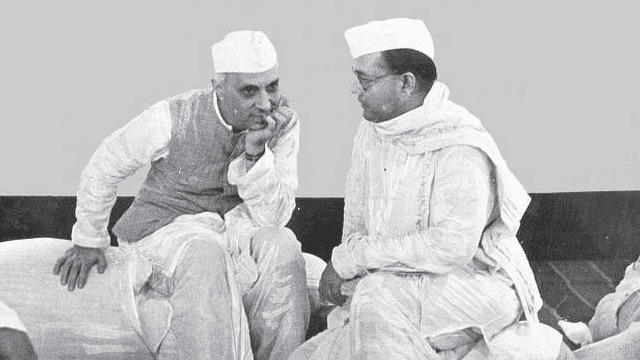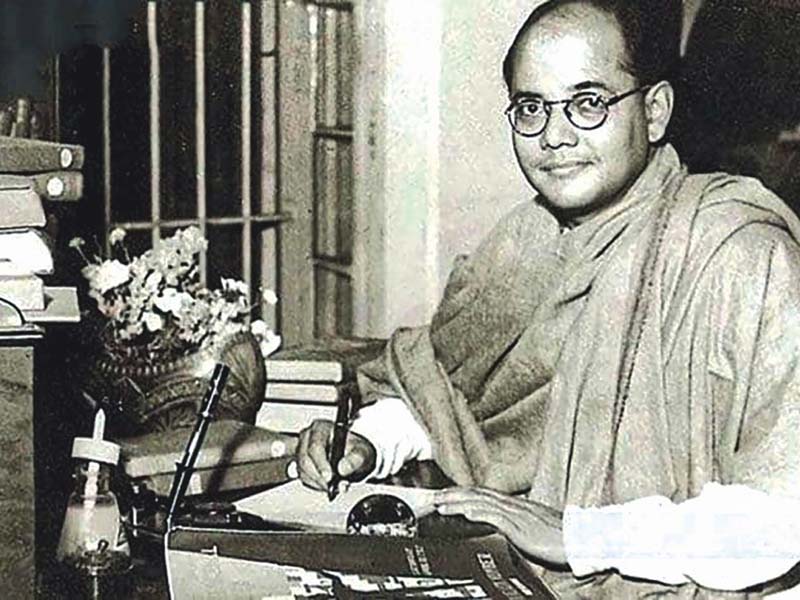Objective: The purpose of this note is to help readers understand Netaji Bose and learn about his contribution to the independence movement of India and his relationship with the Congress party and its leaders.
By Suresh Sharma. First Published on 05 September 2020
Mahatma Gandhi (paraphrased) on Bose – “ He is one of the most patriotic leaders of our times and unparalleled in his devotion to India”. Similarly Bose had on many occasions praised Mahatma Gandhi and Nehru and other leaders of the Congress despite differences among them on approaching the Indian Freedom Struggle and providing leadership. When Bose was the Congress President, he set up the planning commission within the party and appointed Jawaharlal Nehru as its chairman. Although many try to show the differences in their approaches as un-bridgeable faultlines, in reality they were comrades and learnt to resolve these differences and move forward for the larger cause of national freedom. In many of their statements and actions, we find glimpses of their great regard and respect for each other as well as a respect for the approaches that each pursued towards their common cause.
What was the Role of Netaji Bose in the Independence Movement?
In 1928, the Motilal Nehru Committee appointed by the Congress declared in favour of Domination Status to India, but Subhas Chandra Bose along with Jawaharlal Nehru opposed it. They both asserted that they would be satisfied with nothing short of complete independence for India. Bose also announced the formation of the Independence League. He was jailed during the Civil Disobedience movement in 1930 and released in 1931 after the Gandhi-Irwin pact was signed. He protested against the Gandhi-Irwin pact and opposed the suspension of the Civil Disobedience movement, especially when Bhagat Singh and his associates were hanged. Subhas Chandra Bose was soon arrested again under the infamous Bengal Regulation. After a year he was released on medical grounds and was banished from India to Europe.
With an aim to promote politico-cultural contacts between India and Europe, he took steps to establish centres in different European capitals. Defying the ban on his entry to India, Subhas Chandra Bose returned to India and was again arrested and jailed for a year. After the General Elections of 1937, the Congress came to power in seven states and Bose was released. He started a mass movement against the usage of Indian resources and men for the Great War. There was a tremendous response to his call and he was put under house arrest in Calcutta. In January 1941, Subhas Chandra Bose disappeared from his home in Calcutta and reached Germany via Afghanistan.
Working on the maxim, that “an enemy’s enemy is a friend”, Netaji sought the cooperation of Germany and Japan against the British Empire. In January 1942, he began his regular broadcasts from Radio Berlin, which aroused tremendous enthusiasm in India. In July 1943, he arrived in Singapore from Germany. In Singapore, he took over the reins of the Indian Independence Movement in East Asia from Rash Behari Bose and organised the Azad Hind Fauj (Indian National Army) comprising mainly of Indian prisoners of war. Azad Hind Fauj proceeded towards India to liberate it from British rule. En-route, it liberated the Andaman and Nicobar Islands. The I.N.A. headquarters were shifted to Rangoon in January 1944. The Azad Hind Fauj crossed the Burma Border, and stood on Indian soil on March 18, 1944. However, the defeat of Japan and Germany in World War II forced the INA to retreat and its objective remained unaccomplished.
What were the views of Subhas Chandra Bose about Mahatma Gandhi?
What Bose thought about Gandhiji could be understood from his statements which follow – “There is something about Mahatma Gandhi, which appeals to the mass of the Indian people.. In 1920, India stood at the cross-roads. Constitutionalism was dead; armed revolution was sheer madness. But silent acquiescence was impossible. The country was looking for a new leader. Then there sprang up Indian’s man of Destiny- Mahatma Gandhi- who had been biding his time all these years and quietly preparing himself for the great task ahead of him.” – The Indian Struggle- by Subhas Chandra Bose
On 6th July 1944, in a broadcast on Azad Hind Radio addressed to Gandhiji, Netaji Bose said: “India’s last war of independence has begun …. Father of our Nation! In this holy war of India’s liberation, we ask for your blessing and good wishes.” – India’s Struggle for Independence, Bipin Chandra, Mridula Mukherjee
In a speech Netaji says, “Gandhi is in many ways a complex personality, and this needs to be factored in, in order to understand him better. There are two distinct aspects to Gandhi — the political leader and the philosopher. We have been following him in his capacity as a political leader, but we have not embraced his philosophy. We need to ask, can we separate the two aspects? Why, if we do not accept his philosophy, are we following him? Gandhi being a practical politician has never forced his philosophy on others. Consequently though we are following him in our political struggle, we are free to follow our own philosophy. If Gandhi had tried to thrust his philosophy on us, we would not have accepted him as a leader. But he has kept his philosophy separate from his political struggle.”
What was the relationship like between Bose and Nehru?
Bose named four of his men’s battalions of the Indian National Army (INA) after Gandhi, Nehru, Azad and Subhas. It is a strong enough piece of evidence of the kind of respect Netaji had for these three leaders, despite the different paths each had adopted. Nehru and Bose were two leaders in the Congress, who were ideologically the closest. Both considered socialism as the best system for India and were on the same page on crucial matters, such as planning and secularism. Both were also the leading figures in the Congress, who initiated the idea of Sampoorn Swaraj, i.e., the end of British rule and independence for India. Both opposed the Gandhi-Irwin pact. Nehru vehemently supported Bose for Congress president in the first round, keeping silent in the second year, because Gandhiji was opposing Bose this time around and Nehru could never go openly against Gandhiji. Netaji felt hurt about this.
On issues such as loyalty to Gandhi, they had differences. While Nehru considered Gandhiji indispensable for the independence of India, Bose didn’t feel as strongly. Even about the Axis forces (Germany, Italy, Japan) and Allied forces (USA, UK, France), Nehru and Bose had diagonally opposite views. Nehru considered the Hitler-Mussolini-Hirohito led Axis forces a much bigger evil than the Allied forces. So, when Bose went with the Axis forces, Nehru was very angry with him and said that if Subhas wins with the support of Hitler, he would take up his sword and fight him personally.
How was Netaji’s Relationship with Sardar Patel?
The relationship of Sardar Patel with Bose was not very smooth, and it deteriorated after the death of Vithalbhai Patel, who left three-fourths of his estate to Bose for helping him during his illness, to be used ‘preferably for publicity work on behalf of India’s cause in other countries’. On this, a legal case was fought between the two, which ended in favour of Sardar Patel, the next of kin. Sardar Patel opposed the candidature of Netaji for president of the Congress both the times. Patel wanted the Congress governments elected in 1937 to continue in office, whereas Bose wished ‘to pull out all the Congress ministries and war with the Raj, a course that appeared unwarranted and unwise to Patel’. However, Patel admired Subhas’s bravery’ in exile and years later, in 1946, he assisted the personnel of the Indian National Army, when they returned to their homeland. Patel and Bose had some ideological differences too. Bose was a great believer in socialist planning, whereas Patel was more sympathetic to private enterprise. – Rajmohan Gandhi, historian.
What was role of Pt. Nehru and other Congress Leaders in the Trial of the INA soldiers?

After the defeat of Japan, many members of the Indian National Army did return home. Ordinary soldiers were allowed to return to their villages, but some senior officers were accused by the British rulers of being deserters, since they had left the service of the British Indian army to join the ‘enemy’. The trial was conducted in the precincts of the Red Fort. The responsibility of defending INA prisoners was taken up by the Congress and Bhulabhai Desai, Tej Bahadur Sapru, K.N. Katju, Nehru and Asaf Ali appeared in court at the historic Red Fort Trials. The Congress organised an INA Relief and Enquiry Committee, which provided small sums of money and food to the men on their release, and attempted, though with marginal success, to secure employment for these men. INA-day on 12 November and INA-week from 5th to 11 November 1945 was also observed. – India’s Struggle for Independence: page 473-74)
What were the views of Netaji Bose about the Hindu Mahasabha/RSS?
In his book, ‘The Indian Struggle’ (first published in 1935), Bose sharply criticised the Hindu Mahasabha. He repeatedly called them ‘reactionary’, ‘the mirror image of Islamic fundamentalists’, ‘playing into the Raj’s hands by undermining the Hindu-Muslim unity’, sought to be fostered by Gandhi and by Bose himself. Bose writes that ‘the Hindu Mahasabha, like its Moslem counterpart, consisted not only of erstwhile nationalists, but also of a large number of men, who were afraid of participating in a political movement and wanted a safer platform for them’. A famous statement of his about them is – “On the question of national unity, I would like to give you a friendly warning that British propaganda tries to give the world the impression that the Muslims of India do not support the Independence movement. This is wrong. Very often you read in the papers about certain organizations, like Muslim League or Hindu Mahasabha. The British boost these organizations, because they are in their policy…!” Bose warned Dr. Syama Prasad Mookerjee, who later founded Jan Sangh (now BJP) to “keep away from Bengal or I will see to it that you are finished, by force if need be, even before you are born”(from personal diary of SP Mukerjee).
What are the facts surrounding the death of Bose?
From various documents published by British, Japan and Taiwan governments, it is clear that Netaji got killed in a crash of a Japanese fighter plane, while it was taking off. All the survivors of that crash, including his only aide during that journey, along with staff of the hospital, where Bose was attended to before his death, have testified that Bose died due to burn injuries sustained during the crash. There is now a whole bunch of these documents available on the internet. Sugata Bose, Professor of History of Harvard University and grandnephew of Bose addressed this question in the last chapter of his book “His Majesty’s Opponent” titled “The Mortal End of a Deathless Hero” that there is very strong evidence including numerous eye-witness testimonies that Bose sacrificed his life for his country’s freedom on August 18, 1945. Most of his relatives, including his daughter and grandnephews are convinced that Netaji died on that fateful day. If Netaji were alive, why wouldn’t he have appeared? Moreover, he would have been 122 years old now.
Why does the RSS/BJP try to deny that Bose died in that plane crash?
RSS/BJP had no leader in the whole history of the Independence Movement, who made sacrifices and contributions to the freedom struggle. When compared to Congress leaders, their leaders are as pygmies before giants. To get rid of this inferiority complex, the RSS/BJP either try to appropriate leaders from the Congress party or create confusion about their relationships, in order to draw attention away from their own lack of leaders. Refusing to accept that Netaji died in that plane crash is another similar diversionary tactic.
Therefore, on his 122nd birth anniversary, our best tribute to Netaji would be to understand the value of his role in the freedom struggle and learn lessons from his life, so that we could make positive contributions to the nation, that he decdicated his life to.
Disclaimer: The opinions expressed within this article are the personal opinions of the author. AlignIndia does not take any responsibility for the content of the article.
Suresh Sharma is a former Jt Director, Jawaharlal Nehru Leadership Institute, New Delhi.


